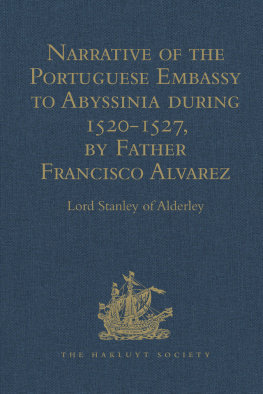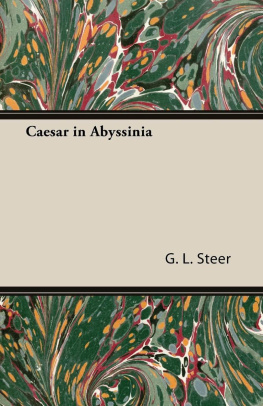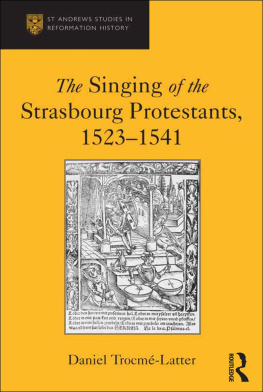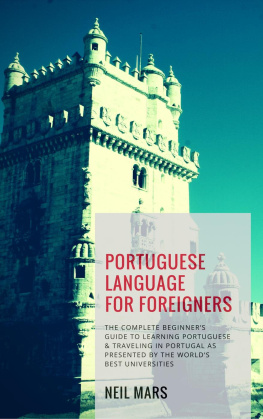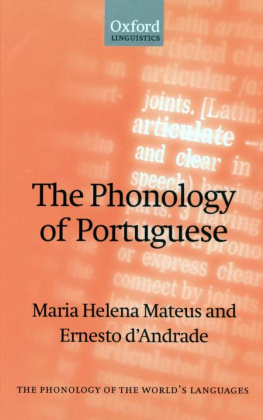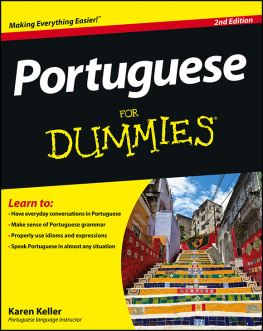The Portuguese Expedition to Abyssinia in 15411543, as narrated by Castanhoso
With Some Contemporary Letters, the Short Account of Bermudez, and Certain Extracts from Correa
Edited by
R.S. WHITEWAY
First published by Ashgate Publishing
Published 2016 by Routledge
2 Park Square, Milton Park, Abingdon, Oxon OX14 4RN
711 Third Avenue, New York, NY 10017, USA
Routledge is an imprint of the Taylor & Francis Group, an informa business
All rights reserved. No part of this book may be reprinted or reproduced or utilised in any form or by any electronic, mechanical, or other means, now known or hereafter invented, including photocopying and recording, or in any information storage or retrieval system, without permission in writing from the publishers.
Notice:
Product or corporate names may be trademarks or registered trademarks, and are used only for identification and explanation without intent to infringe.
Founded in 1846, the Hakluyt Society seeks to advance knowledge and education by the publication of scholarly editions of primary records of voyages, travels and other geographical material. in partnership with ashgate, and using print-on-demand and e-book technology, the Society has made re-available all 290 volumes comprised in Series i and Series ii of its publications in both print and digital editions. For information about the Hakluyt Society visit www.hakluyt.com.
ISBN 13: 978-1-4094-1377-6 (hbk)
WORKS ISSUED BY
The Hakluyt Society.
__________
THE PORTUGUESE EXPEDITION
TO
ABYSSINIA.
SECOND SERIES.
No, X.
THE CASINHA AT THE CHURCH OF ST. ROMANOS (p. 26).
THE
PORTUGUESE EXPEDITION
TO
ABYSSINIA
IN 15411543,
AS NARRATED BY CASTANHOSO,
WITH SOME
CONTEMPORARY LETTERS, THE SHORT ACCOUNT
OF BERMUDEZ, AND CERTAIN EXTRACTS
FROM CORREA.
Translated and Edited
BY
R. S. WHITEWAY,
BENGAL CIVIL SERVICE (RETIRED).
THIOPIA was saved by four hundred and fifty Portuguese, who displayed in the field the native valour of Europeans, and the artificial powers of the musket and cannon.GIBBON, chap. 47.
LONDON:
PRINTED FOR THE HAKLUYT SOCIETY.
____
M.DCCCCII.
LONDON:
PRINTED AT HE REDFORD PRESS, 20 AND 21, BEDFORDBURY, W.C.
COUNCIL
OF
THE HAKLUYT SOCIETY.
_______________
SIR CLEMENTS MARKHAH. K.C.B., F.R.S.. Press. R.G.S., President.
THE RIGHT HON. THE LORD STANLEY OF ALDERLEY, Vice-President.
REAR-ADMIRAL SIR WILLIAM WHARTON, K.C.B., F.R.S., Vice-Presidtnt.
CHARLES RAYMOND BEAZLEY, M.A.
COMMR. B. M. CHAMBERS, R.N.
COLONEL GEORGE EARL CHURCH.
SIR WILLIAM MARTIN CONWAY.
WILLIAM FOSTER, B.A.
F. H. H. GUILLEMARD, M.A., M.D.
EDWARD HEAWOOD, M.A.
JOHN SCOTT KELTIE, LL.D.
FREDERICK WILLIAM LUCAS.
ALFRED PERCIVAL MAUDSLAY.
MOWBRAY MORRIS.
EDWARD JOHN PAYNE, M.A.
ERNEST GEORGE RAVENSTEIN.
HOWARD SAUNDERS.
HENRY WILLIAM TRINDER.
CHARLES WELCH, F.S.A.
RICHARD STEPHEN WHITEWAY.
BASIL H. SOULSBY, B.A., Honorary Saretary.
________
T RANSLATORS without special local knowledge have ever laid themselves open to the scoffer. The eighteenth-century translator of certain French Travels in Egypt, who made his writer say that on a particular day he saw many camels, though none came near enough for a shot, wrote in good faith; for in a note he says that in the original the word is chameau deau, but that he does not know if the water-camel be a particular species or not. His author digged a pit for him by translating the Arabic for a pelican, Jimmel el bahr, into chameau deau, and, having no local knowledge, he fell in. The translator of the accounts here printed has had his predecessors fate before his eyes; still, there is no work in English giving the original narratives of the Portuguese Expedition of 154143; and although finality can only be attained by the editor who studies these narratives on the spot, still it will be long before the political conditions of Abyssinia allow orderly work of this kind. Meanwhile, it will be some gain to set out the problems requiring solution, and to bring together the statements of the different authorities.
The main reliance must always be on the Portuguese author Castanhoso; but there are also the Ethiopian writers now accessible in French, German, Italian, and Portuguese translations, and the Arabic chronicles now rendered into French. As yet English scholars have done little, and, although there is a wealth of manuscripts in this country, Bruce remains, as he has been for over a century, our sole original worker in this field. The contemporary narratives of the Portuguese Expedition into Abyssinia, commanded by D. Christovo da Gama, fourth son of D. Vasco da Gama, which have been brought together here, consist of the books of Castanhoso and Bermudez, some letters to and from the King of Abyssinia, and some extracts from the contemporary chronicler Correa. These have been as far as possible illustrated from the sources above mentioned, as well as from the works of travellers in the country.
The Portuguese Expedition was decisive in that Abyssinia has since remained Christian; it is seldom that results so momentous have been attained by means so disproportionate. To us it has this special interest, that the English campaign of 1867, with its twelve thousand men, started from a point only a few miles distant from Massowa, and joined the route of their predecessors near Senaf; if the Portuguese furthest point south was, as suggested here, the mountain of Amba Sel, it lies but a few miles from the mountain fortress of Magdala stormed by the English.
Conceding that there is interest in the mere coincidence of the lines of advance, there is certainly interest more intense in the disproportion of the means employed, and in the divergence of the aims cherished. In a spirit that had survived from the age of the Crusades, Portugal cast on shore and abandoned her expedition, led by a descendant of one of her most illustrious sons; their lives were nothing provided the desired result were attained. That result was partly religious and partly political. On the other hand, the English Expedition had no religious aim: Muhamedans and Hindus marched with Christians against a Christian ruler. The direct aim was the release of the English and other European prisoners, the indirect was to enforce respect for the English name. Little Portugal then flung aside as of no importance the lives of four hundred of her subjects; more populous England poured out vast treasure to save the liberty of half a dozen of hers. The distinction is one of national importance, and who shall say that England has lost by her jealousy for the honour of her flag?


